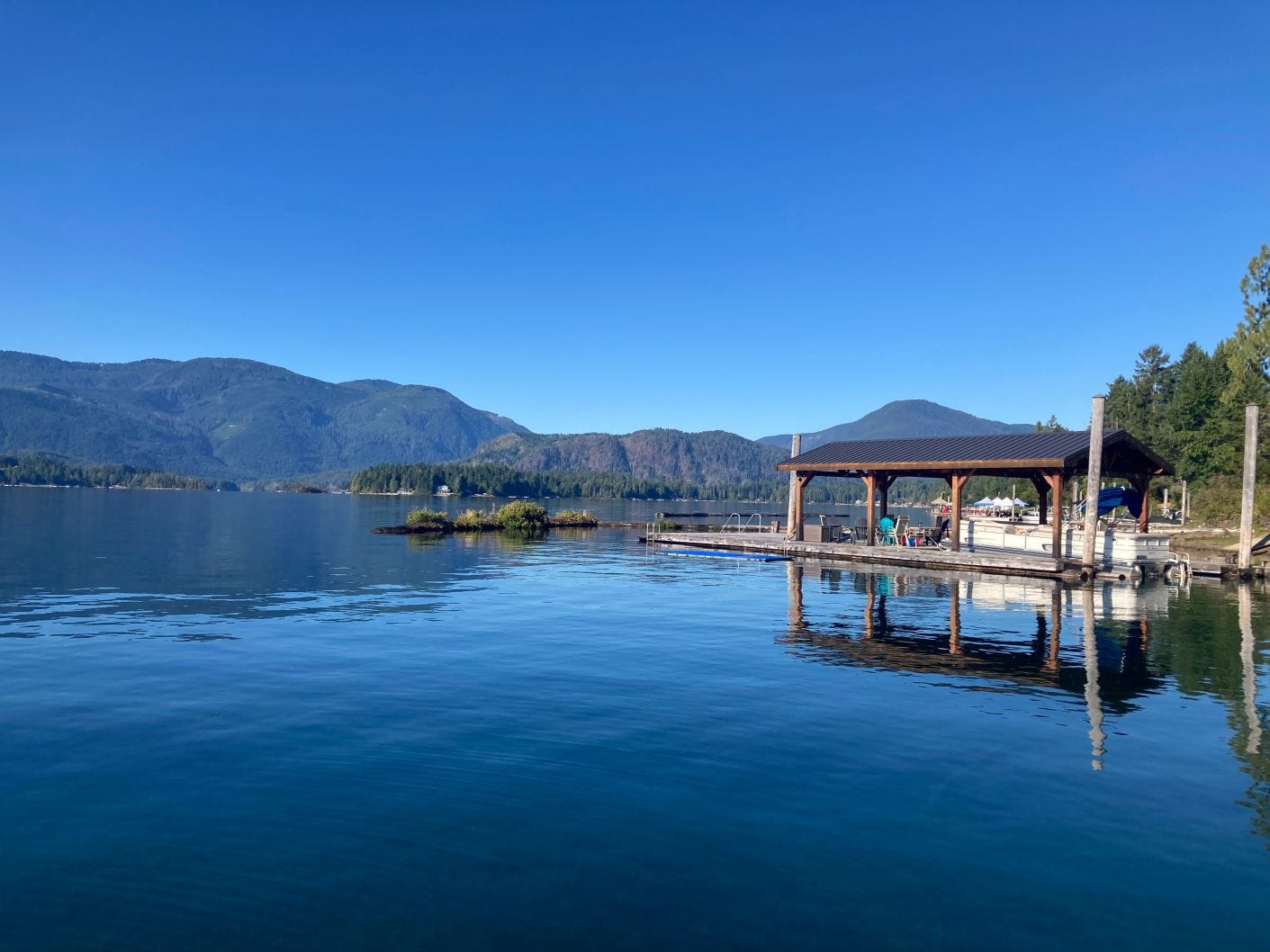Summer Lake Fun
Why do you invest?
Last week I spent a week at Sproat Lake on Vancouver Island.
It was voted the best lake in British Columbia, Canada:
https://www.cbc.ca/news/canada/british-columbia/sproat-lake-best-in-bc-winner-1.6927373
For those of you who haven't been there before, the lake is MASSIVE!
With a surface area of 9,330 acres, a shoreline almost 91 km (56 miles), it feels like you're boating in an ocean next to the shore.
What a beautiful place!
What does this have to do with investing?
You may be wondering, why write about this in a newsletter focused on real estate investing, markets and economy?
To me, it has EVERYTHING to do with it.
Some of my readers have taken my courses in the past.
There's this concept I like to teach them:
Net vs. gross thinking
Most people tend to follow the "gross".
Whether it's "gross income", or "gross returns" or even "gross efforts".
What really matters at the end of the day, is "net".
What's actually left over for one to keep.
Net vs. gross income
For example, someone with a fancy job title sitting in a fancy office earning 400k / year may sound like they’ve "made it".
After taxes, hours of commuting, paying for extra wellness care because the job is highly stressful, the net income at the end of the day may be 130-150k at best.
Comparing this to someone who runs a small and simple business, with staff doing some of the work, working half time, and a significantly lower small business tax rate, they end up netting 150k with half of the stress.
The later option isn't very glorifying.
Most people wouldn't think much of that person's success.
Yet, this person is living the life, enjoying putting in a relatively minimum effort while receiving a good income.
The "net" outcome in this case beat the prior option - when one doesn't value the high status of being an executive.
Net return on investment
Similar thinking can be applied to investing.
I see some investors obsessed over the top line ROI, or "gross return".
I'm only interested in investments that give me a return higher than 16% IRR.
I hear that often.
What does that even mean?
There are tons of investments that has the potential to deliver a high return, while carrying a huge amount of downside risk.
Does it matter if the projected gross return is 16% or 20% when the next market down turn end up wiping out the invested capital, resulting in a 100% total loss?
What's the net return in this case?
-100% loss.
An 8% annual net return looks great now!
We see that in every market cycle, when the market flips to the other side, a lower return that may not be attractive during the high flying time, all of a sudden, looks like a great investment.
Net return is what an investor gets to keep at the end of the day, after paying taxes, their time involved to do due dilligence and adjusted for the risk they took.
Why do you invest?
For me, investing is a vehicle.
It lets me build relationships with great people.
The lake vacation was offered to me by a couple of my investor partners.
Our relationships weren't built on "gross".
It wasn't just about the ROI %.
It's about the net.
What's left over after everything is all said and done.
What's left, is a better life to be shared together by my partners and I.
After all, a better life is what everyone is looking for.
That's what we end up "netting".
Thank you to my partners for the great trip and memories.
I look forward to our next adventure!
Together.
If you like my work, I invite you to share it with others.
Eric Chang
Edmonton, Alberta, Canada
August 12, 2025
Copyright © 2025 EC Research Group.
No part of this publication may be reproduced, distributed, or transmitted in any form or by any means, including photocopying, recording, or other electronic or mechanical methods, without the prior written permission of the publisher, except in the case of brief quotations embodied in critical reviews and certain other noncommercial uses permitted by copyright law.
The information provided herein is believed to be accurate and reliable, but EC Research Group does not guarantee its accuracy or completeness. The content is for informational purposes only and is not intended to be a substitute for professional financial advice. EC Research Group is not a financial advisor and does not provide personalized financial advice. The views and opinions expressed in this publication are those of the author and do not necessarily reflect the official policy or position of EC Research Group. The content may be subject to change without notice and may become outdated over time. EC Research Group is under no obligation to update or revise any information presented herein.
Investments involve risks, and individuals should consult with a qualified financial advisor before making any investment decisions. Prospective investors should carefully consider the investment objectives, risks, charges, and expenses of any investment before investing.


